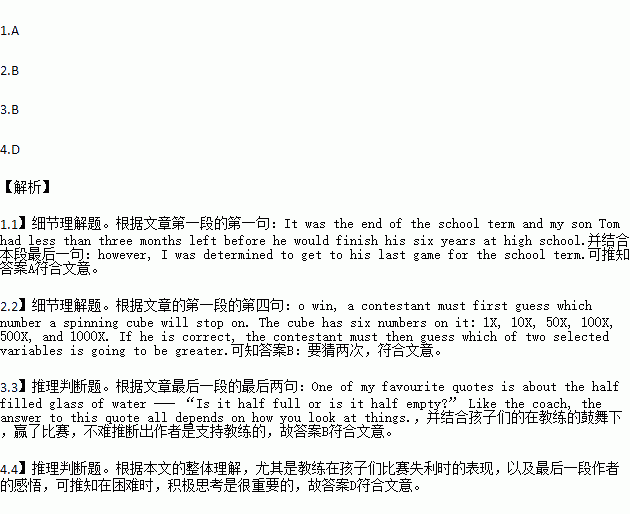题目内容
It was the end of the school term and my son Tom had less than three months left before he would finish his six years at high school. During this time he had developed a love for basketball. Sadly, because of my work over the last twelve months, I had only been able to attend a few of his games; however, I was determined to get to his last game for the school term.
Tom’s team came out in the first 10 minutes with a burst of goals that saw them leading by just over 20 points at the end of the first half. The second half changed as the other team quickly played themselves back into the game. Tom’s team started to miss an increasing number of shots. It was at that point that the coach called his first time out.
The noise of the spectators (观众) became quiet as the coach spoke to them. He had the team standing in a half circle, but he squatted (蹲) down, looking up at them and fiving some very calm and clear instructions on what they needed to do in the last couple of minutes. As he stood up to allow the team to return to the court, I saw him give some further words of encouragement to all of them.
You could see that he knew that the team was fighting to save the game and that he needed to lift them up. By squatting down he placed himself in a position where he was talking up to them, rather than down or at them, and as the players went back onto the court his words of encouragement served to lift their energy and spirits.
Well, Tom’s team went on to win the final by 5 points. As I drove away I thought about what can happen to us all in our everyday life. One of my favourite quotes is about the half filled glass of water --- “Is it half full or is it half empty?” Like the coach, the answer to this quote all depends on how you look at things.
1.Why did the writer e to see his son play basketball?
A. Because his son would graduate from high school.
B. Because he felt sorry for never watching his son play.
C. Because it was a final his son played a key role in.
D. Because he had a strong interest in basketball himself.
2.By squatting down, the coach wanted to _____ .
A. talk about what the players were doing wrong
B. make the players feel better
C. prevent spectators from hearing what he said
D. show his anger at the bad performance of the players
3.What is the writer’s attitude towards the coach?
A. Negative. B. Supportive. C. Interested. D. Unconcerned.
4.What can we infer from the passage?
A. A father should care about his son at school.
B. Playing hard is rewarded with a close match.
C. What a coach says has the most influence on players.
D. Looking at things positively is important in hard times.
 云南师大附小一线名师提优作业系列答案
云南师大附小一线名师提优作业系列答案There are a number of advantages when it comes to living alone. However, it also comes with a few safety concerns. You still never know who will be around the corner. Don’t be another victim; be sure to follow our tips.
1. All doors should be kept locked.
Always keep your doors locked when you are in your apartment or dorm. Make sure the doors are closed behind you when you come into the building and never leave your room unlocked, even when you are in it. There’s always a chance that someone might sneak in while you are unaware. Always try to remember to close doors behind you to ensure your safety.
2. Don’t lose your keys.
Even if you do everything you can to keep the doors locked, criminals might still be able to e into your house with a key. Always know where your keys are to prevent this. Never put them down in a public place or give them to friends. Also, before you bring your car into the repair shop, take off the house keys.
3. When it comes to safety, standing up for yourself is important.
If you aren’t getting all the security features you want, don’t be afraid to ask. If your lighting situation is less than ideal, discuss this with your supervisor or landlord. Talk to the campus security organization if you think a security phone near your dorm is a good idea. Request that the building employ someone to monitor those entering and leaving the building. You should feel safe where you reside (居住于), so stand up for your rights.
4. Be careful.
You still might find yourself in a potentially dangerous situation. Check your peephole (窥视孔) before letting anyone in. Whenever you witness something around your building that makes you uncomfortable or suspicious just dial 911. It is a good idea to always walk with a friend instead of alone. Be familiar with people who live in the building, so you can keep track of anyone that is a stranger.
1.to follow when living alone | Leave your doors 2.as soon as you come into the building so that someone is not able to sneak in. |
Never lose your 3.or give them to others. | |
4.up for your rights: Discuss this with your supervisor or landlord if you are not 5. with your lighting situation. Request the building to have someone 6.to monitor those entering and leaving the building. Ask the campus security organization to fix a security7.near your dorm. | |
Be careful Dial 911 when you find something unfortable or 8. When walking, keep your friends in 9.instead of alone. Be familiar with people in the neighborhood so that you will pay attention to 10. |

